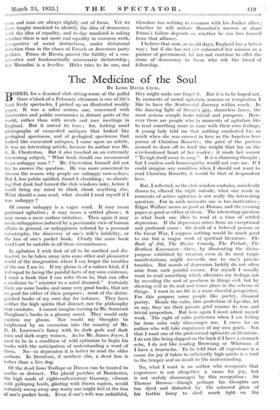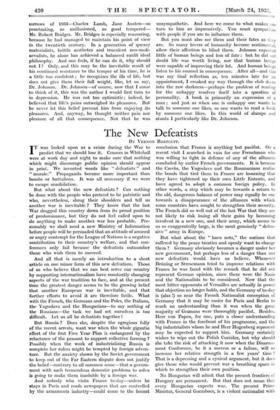The Medicine of the Soul
BY LORD DAVID CECIL.
BORED, for a deserted club sitting-room at the pallid three o'clock.of a February afternoon is one of life's least lively spectacles, I picked up an illustrated weekly paper. It was a sober serious one, concerned with discoveries and public ceremonies in distant parts of the world, rather than with revels and race meetings in England. But it sated its turn ; for, lurking amid photographs of excaVated antiques that looked like geological specimens, and of geological specimens that looked like excavated antiques, I came upon an article. It was an interesting article, because its author was Mr. G. K. Chesterton. But it also touched on an extremely interesting subject, "What book should one recommend to an unhappy man ? " Mr. Chesterton himself did not try to answer the question. He was more :concerned to discuss the reason why people arc unhappy now-a-days. But I, less public spirited, found it absorbing ; so absorb- ing that dusk had turned the club windows inky, before I could bring my mind to think about anything else. What should a man read, what should I read myself if I was unhappy ?
Of course unhappy, is a vague word. It may mean profound agitation ; it may mean a settled gloom ; it may mean a mere surface irritation. Then again it may mean unhappiness induced by a pessimistic view of human affairs in general, or unhappiness induced by a personal catastrophe, the discovery of one's wife's infidelity, or the loss of one's pocket book. Clearly the same book woull not be suitable in all these circumstances.
In agitation I wish first of all to be soothed and dis- tracted, to be taken away into some other and pleasanter world of the imagination where I can forget the troubles of the one I am in. If my gloom is of a calmer kind, if I feel equal to facing the painful facts of my own existence, I want a book that I can refer them to, that can offer a medicine to "minister to a mind diseased." Certainly there are some books, and some very good books, that are no good for either of these purposes ; most of the distin- guished books of my own day for instance. They have neither the high spirits that distract, nor the philosophy that comforts. I cannot imagine turning to Mr. Somerset Maugham's books in a gloomy mood. They would only confirm my gloom. Nor would my thoughts be brightened by an excursion into the country of Mr. D. H. Lawrence's fancy with its dark gods and dark loins and dark angry women. As for Mr. James Joyce, I need to be in a condition of wild optimism to begin his books with the anticipation of understanding a word of them. No—in depression it is better to read the older authors. In literature, if nowhere else, a dead lion is better than a live dog.
Of the dead lions Trollope or Dumas can be trusted to soothe or distract. The placid parishes of Barchester, the high roads of eighteenth-century Gascony, vibrant with galloping hoofs, glinting with drawn rapiers, would certainly sweep away any worry one might feel at the loss of one's pocket book. Even if one's wife was unfaithful, they might make one forget it. But it is to be hoped not. In moments of moral agitation, remorse or temptation I like to have the Sentimental Journey within reach. In the dancing light of Sterne's gay, shameless fancy, the most serious scruple looks trivial and pompous. How- ever there are people who in Moments of agitation like to read something more in tune with their own feelings. A young lady told me that nothing comforted tier so much when she was crossed in love as the hopeless love poems of Christina Rossetti ; the grief of the poetess seemed to draw off to itself the weight that lay on the o'er-burdened heart of her reader ; it made her sorrow "To sigh itself away in song." It is a charming thought ; but I confess such homoeopathy would not cure me. III could imagine any condition when I should not want to read Christina Rossetti, it would be that of despondent love.
But, I reflected, as the club window-curtains, noiselessly drawn to, effaced the night outside, what one reads in moments of active agitation is not really the interesting question. For in such moments one is too inattentive.; Edgar Wallace seems as good as Dumas, and the evening paper as good as either of them. The interesting question is what book one likes to read at a time of settled 'depression. If the depression arises from an exceptional and profound cause : the death of a beloved person, or the Great War, I suppose nothing would be much good to one but a major work of spiritual literature. The Book of Job, The Divine Comedy, The Prelude, The Brothers Karamazov—these, by illustrating the divine purpose exhibited by creation even in its most tragee manifestations, might reconcile one to One's private troubles. But moods of depression luckily do not often arise from such painful causes. For myself I usually want to read something which alleviates my feelings not by revealing the soul of goodness in things evil, but by showing evil in its real and lesser place in the scheme of things. I want to see life in a more cheerful perspective. For this purpose some people like poetry, classical poetry. Beside the Calm, firm perfection of Lycidas, let us say, they see their private grief resume its true and trivial proportion. But here again I must admit myself weak. The sight of calm perfection when I am feeling far from calm only discourages me. I crave for an author who will take cognizance of my own griefs. Not that I want one of the professional optimists of literature. I do not like being slapped on the back if I have a stomach ache, I do not like reading Browning or Whitman if I have a heartache. To be told that all experience is a cause for joy if taken in sufficiently high spirits is a trial to the temper and an insult to the understanding.
No, what I want is an author who recognizes that experience is not altogether a cause for joy, but is not unduly discouraged by this recognition : Sir Thomas Browne—though perhaps his thoughts are too dyed and distorted by the coloured glass of his Gothic fancy to shed much light on the sorrows of 1933—Charles Lamb, Jane Austen—so penetrating, so unillusioned, so good tempered- _ Mr. Robert Bridges. Mr. Bridges is especially reassuring, because he had managed to maintain his point of view in the twentieth century. In a generation of queasy materialists, brittle aesthetes and truculent neo-medi- aevalists, he alone has achieved a balanced sunlit ideal _ philosophy. And one feels, if he can do it, why should not I? Only, and this may be the inevitable result of his continued resistance to the temper of his time, he is a little too confident ; he recognizes the ills of life, but does not give them their full weight, like, let us say, Dr. Johnson. Dr. Johnson—of course, now that I come to think of it, this was the author I would first turn to in depression. He was not too optimistic; indeed, he believed that life's pains outweighed its pleasures. But he never let this belief- prevent him from enjoying its pleasures. And, anyway, he thought neither pain nor pleasure of all that consequence. Not that he was unsympathetic. And here we come to what makes one turn to him so impressively. You must sympathize with people if you are to influence them.
. But you must also see them and their fates as they are. So many lovers of humanity become sentimental, allow, their affection to .blind them. Johnson. expected little of human beings and less of fate : but he did not . doubt life was worth living, nor that human beings • were capable of improving their lot. And human beings listen to his counsel in consequence. After all—and this was my final - reflection as, ten minutes late for an appointment, I_ creaked my way through the club doors into the raw darkness—perhaps the problem of reading for the unhappy, resolves itself into a_ question of personality. A book is primarily an expression of a man ; and just as when one is unhappy one wants to talk to someone one likes, so one wants to read a book by someone one likes. In this world of slumps and stunts I particularly like Dr. Johnson.







































 Previous page
Previous page